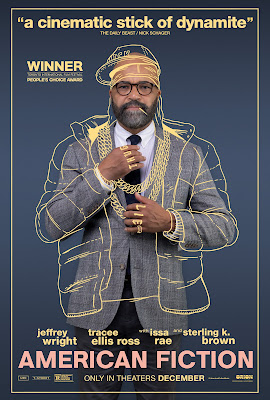Review | American Fiction | 2023
In the days following George Floyd's brutal murder in 2020, many well-meaning white liberals rushed to their computers to order copies of books like Robin DiAngelo's "White Fragility" in an attempt to examine their own racism and complicity in racist systems. Many, of course, learned the wrong lessons from the greater social awareness around racism that sprung up in the wake of Floyd's murder - and while "Erasure," the source material for the new film, American Fiction, was published in 2001, its satire of post "White Fragility" attempts at DEI feel boldly contemporary, as white voices continue to drown out black voices even in initiatives toward greater inclusion.
I realize, of course, that there is a certain irony in a white film critic pointing out such ideas in a film written and directed by a black filmmaker, but therein lies one of the central questions of American Fiction - what does it mean to truly seek out and listen to "diverse voices," who is the audience for black art?Jeffrey Wright stars as Thelonious “Monk” Ellison, an author who is constantly being told by agents, editors, and publishers that his work isn't "black enough." Monk has little patience for writing about what he considers to be cliched "black" themes, but the popular success of a new novel by an author named Sinatra Golden (Issa Rae), written almost entirely in AAVE and focusing on what Monk sees as reductive caricatures, spurs him to write a stereotypical work of his own called "My Pafology" under a pseudonym. But like Bialystock and Bloom, the novel Monk wrote as a joke becomes a runaway success with both white publishers and white audiences, who praise it as real and raw, and he is faced with the dilemma of keeping up his facade, or digging deeper to understand what it truly means to seek out and listen to diverse voices.
The issue is, of course, that as a black author in America, Monk is expected to represent the black experience in his work. But what is the "black experience?" Is it his actual experience, or is white perception of blackness? In the midst of all of this, Monk is busy taking care of his elderly mother, recently diagnosed with Alzheimer's, while also navigating a potential new relationship, and mending strained ties with his brother (Sterling K. Brown). This is his "black experience," but the cliches he dismisses outright also represent experiences outside his own. In that spirit, I wish the film had done more with Issa Rae's character. The way in which the the film pulls the rug out from under us regarding what her character represents, reaving something richer and more three-dimensional than it appeared at first glance is really interesting; it really feels like there was more to explore there.
But it's hard to deny the effectiveness or the timeliness of the satire. You'll certainly find deeper and more incisive explorations of black representation in media in films like Spike Lee's Bamboozled (2000) or Marlon Riggs' Color Adjustment (1991), but American Fiction feels perfectly tailored to our moment - a delicious send-up of the search for truth in a post-truth world, where comforting lies and yes, white fragility, often prevent us from seeing the world for what it really is. It's a strong first feature for Jefferson, and a veritable showcase for the always reliable Wright - whose deadpan delivery belies a world weariness that adds a haunting sense of gravity to Jefferson's acerbic wit.





Comments